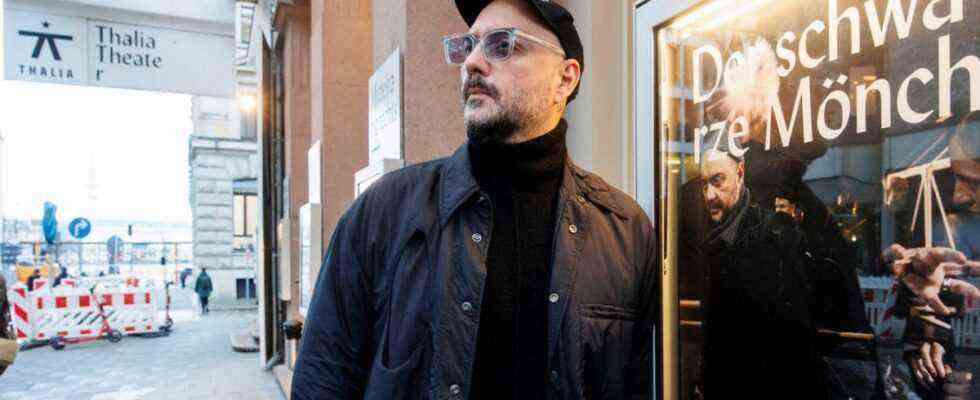He doesn’t answer the most burning question everyone is asking Kirill Serebrennikov right now. Why was this director, who is a similar symbolic figure abroad for the state suppression of art and free speech in Russia like pussy riot, suddenly leave for Germany last weekto stage Chekhov’s “The Black Monk” at the Thalia Theater in Hamburg? What kind of political sign is it that in times of extreme political tensions between the Putin state and NATO, the Russian authorities seem to be carrying out an act of cultural thaw? Or is this permission to leave the country, after the recent ban on the human rights organization Memorial and the escape of journalist Viktor Shenderovich for fear of arrest, just another step towards silencing an unwelcome voice by dumping it abroad?
Serebrennikov, who during his fictitious show trial in Moscow for allegedly embezzled project funds in 2017, his one and a half year house arrest and the subsequent travel ban met with a huge wave of solidarity, especially in the German-speaking cultural scene, does not want to comment on the second intention of this official decision. All the answers he gives to the variously formulated questions about his interpretation of the process are friendly evasions.
“I have no idea,” he says casually in the foyer of the Thalia Theater. “I’m a nice guy and my manners were good,” and he smiles ambiguously. As before every production abroad, you simply applied for permission to leave the country for your work, and this time it was approved shortly after the New Year. He can stay in Hamburg until the premiere on January 22, but is not allowed to travel. As a “workhorse” he now concentrates on this production and does not think about the circumstances. “Maybe later.”
Is his permission to leave the country possibly a kind of attitude test?
Serebrennikov, who since the attempted criminalization of his work five years ago and especially during the episode of his house arrest, has staged various including at the Munich and Hamburg State Opera, but also at the Schaubühne in Berlin, in his 33 square meter apartment in Moscow and then had to transmit this to the rehearsals first via USB sticks and later via video link, obviously has no interest in escalating. Only one question about the complex of his newly approved partial freedom finds a clear answer. Yes, at the moment he is cautious about what he says in public, he explains on the possibility that this permit to leave the country is a kind of attitude test. But not out of fear, but out of reason.
It would be absurd to interpret Serebrennikov’s silence as a fling before state authority. In the predicament he finds himself in, personal weighing of the pros and cons of confrontation is a healthy ethic of self-preservation. Especially since Serebrennikov never, like Pussy Riot or Alexei Navalny, sought a frontal attack against the authorities in Putin’s dependent state. The fact that people tried to make an example of him was probably less the result of a political danger that emanated from him. In a state that worships homophobia as politics right up to the president, it was Serebrennikov’s plan to make a film about composer Tchaikovsky’s homosexual tendencies that persuaded the alliance of government, church and controlled justice to muzzle him.
The fact that Serebrennikov is openly gay himself, and also a Jewish Buddhist and critical artist, may fulfill further criteria of a perpetrator profile in the Russian state of fear, which defends the phantom of normality as an aggressive consensus. And who then shapes people like Andrei Kovrin, the main character of Chekhov’s novel “The Black Monk”, a genius who goes insane because he can’t stand the stress of adapting. “Kowrin is a man on a knife’s edge,” Serebrennikow explains his staging concept. “He finds himself in a very complicated situation between truth and lies, death and life, past and future. And he has to learn how to behave.” And this characterization of his protagonist then suddenly sounds like a self-description of Serebrennikov. And like an encoded answer to the question why he prefers to remain silent.

